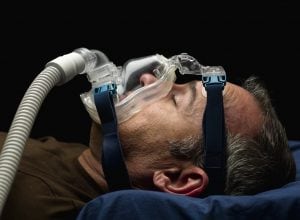What You Should Do if You’re Tired of the CPAP Machine

For many people, it works quite well. But for others, it's not so easy. Even if the treatment is working, it can be so uncomfortable or annoying to use that patients stop using it all together. If you have been using CPAP without success or are non-compliant with the treatment, it's time to look for effective options for the treatment of sleep apnea without CPAP.
In this blog, the sleep apnea specialist at eos dental sleep will explain what to do if you have grown tired of your CPAP machine.
What are the Common CPAP Complaints?
Common complaints about the CPAP method include:
- The noise from the machine is loud enough to wake the patient and/or a sleeping partner
- The mask makes it difficult to sleep comfortably
- The mask causes skin irritation
- The air pressure causes throat irritation and dry mouth
- The air pressure is calculated for one situation only, making sleeping in other positions and parts of the sleep cycle more uncomfortable
- Some mask styles, such as nasal and full face, place enough pressure on your face to move your teeth after prolonged use
What are the Alternatives to CPAP?
Once your doctor pinpoints the cause of your sleep apnea, you can zero in on the cause with a more specific treatment. For example, one common cause of sleep apnea is related to being overweight and carrying extra weight around the neck. In many cases, losing weight can help reduce sleep apnea symptoms, or at least reduce them to the point where only a mild treatment of sleep apnea without CPAP is needed.
For many other people, the cause of sleep apnea is related to mouth anatomy and positioning. This can include the tongue and jaw positioning, along with other soft tissues in the airway. If you have a narrower airway, or an airway that is frequently obstructed by the tongue, a treatment called oral appliance therapy may be an effective option for you.
Oral appliance therapy involves using a custom-made mouth guard that holds your tongue, jaw, and any other parts that are causing the obstruction, in a specific position while you sleep. This effectively stabilizes the airway, preventing the narrowing and the collapsing of any tissues that can cause breathing obstruction at night. There's no motor noise, and no mask. You wear the device in your mouth all night long, and many patients forget that it is even there.
Where Can I Get Treatment of Sleep Apnea Without CPAP in Philadelphia?
If you want to investigate ways to get treatment for sleep apnea without CPAP, and you live in the Philadelphia area, eos dental sleep is available to help you. After a thorough evaluation of your upper airway, our sleep specialist will be able to identify whether your obstruction is caused by problems that can be corrected using oral appliance therapy. If necessary, he may also recommend a sleep study in order to evaluate your sleep apnea condition.
Contact us today to arrange for a consultation so you can get back to enjoying a good night's sleep.
